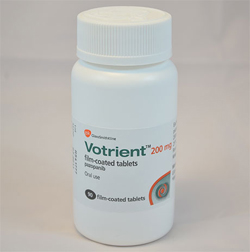 |
| Courtesy of GlaxoSmithKline |
GlaxoSmithKline ($GSK) said Monday that after reviewing data from a Phase III trial, it has withdrawn its application to the European Medicines Agency seeking to expand approval of Votrient to include women with advanced ovarian cancer. Votrient is currently approved in the U.S. and Europe to treat advanced kidney cancer and soft tissue sarcomas.
Rafael Amado, GSK's head of oncology research and development, said in a statement that patients taking Votrient (pazopanib) did show an improvement in progression-free survival rates over those on a placebo, but that the results "do not support an overall positive benefit-risk for Votrient in this indication."
GSK will not seek approvals for Votrient in ovarian cancer in any other countries, according to the statement. "While we are disappointed by these results, we will progress additional analyses which may add to the body of scientific evidence in this disease setting," Amado said.
 |
| GSK Head of Oncology Research and Development Rafael Amado |
The decision marks a setback for Votrient, which has proven to be a strong growth driver for GSK in recent years. The drug brought in $520 million in worldwide sales in 2013--up 78% over the previous year. The drug works by choking off the blood supply to tumors, and when it was approved to treat sarcomas in 2012, it was the first new treatment for such tumors to hit the market in decades.
Glaxo has additional trials of Votrient underway in kidney cancer, which include testing it in combination with MK-3475, a highly anticipated PD-1 drug from Merck ($MRK). The two companies announced the partnership last December, noting that Merck--which has suffered an R&D drought of late--might also collaborate with GSK on other oncology projects.
Still, GSK's decision to pull back on Votrient in ovarian cancer will be a disappointment for patients and their doctors. Late-stage ovarian cancer has proven notoriously difficult to treat, sparking a range of new research approaches in academia. Scientists at Tel Aviv University, for example, are developing nanoparticles that can deliver chemo straight to tumors.
- here's GSK's press release
- read more at the WSJ (sub. req.)
- here's Pharmafile's take